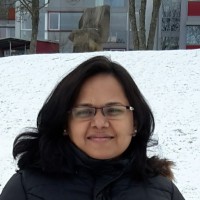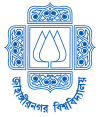Special Needs Education Centre (SNEC)

Dr. Rumana Rois Department of Statistics and Data Science
Director (Honorary)
Dr. Rumana Rois
Message from Director (Honorary)
Jahangirnagar University is the first and only university in Bangladesh that has been working and researching children with special needs for 15 years. On October 28, 2009, the 273rd Syndicate approved the establishment of JU Special Needs Education Centre (SNEC), a school for children with special needs (the syndicate meeting was conducted on 11.07.2009). The mission of the SNEC is to nurture special needs children and young adults in safe, joyful, inclusive, and supportive environments through education, therapeutic intervention, and community acceptance. The mission of the SNEC also includes conducting research to understand autism and to improve the health and well-being of children and young adults with autism and their families. Hence, the vision and mission of SNEC are:
|
Vision: |
To bring together a diverse community to provide personalized support to individuals with autism, promoting well-being and enabling active, purposeful lives. |
|
Mission: |
§ To nurture special needs children and young adults in safe, joyful, inclusive, and supportive environments through education, therapeutic intervention, and community acceptance. § To improve and empower the lives of individuals with autism and their families. § Conducting research to better understand autism and to improve the health and well-being of children and young adults with autism and their families. |
The SNEC conducts different programs and speaks at different seminars to aware the community people to understand the benefits of an inclusive society by addressing autism. The SNEC comprises one director (honorary), eight members of the board of directors, and nine academic and support staff. The chairman of the board of directors is Prof. Dr. M. Mahfuzur Rahman, Pro-Vice-Chancellor (Academic), JU and the director (honorary) is Prof. Dr. Rumana Rois, Chairman, Department of Statistics and Data Science, JU.
Table 1: Year-wise Students and Teachers’ Summary Information of SNEC
|
Year |
No. of Students |
Students from JU |
Students from Outside |
Teachers |
Therapists |
Support Staff |
Students’ Frequency by Type of Autism |
|
2018 |
19 |
6 |
13 |
7 |
2 |
1 |
NDD-16, DS- 2, ID- 1 |
|
2019 |
17 |
5 |
12 |
7 |
2 |
1 |
NDD-14, DS- 2, ID- 1 |
|
2020 |
19 |
5 |
14 |
7 |
2 |
1 |
NDD-16, DS- 2, ID- 1 |
|
2021 |
17 |
4 |
13 |
6 |
2 |
1 |
NDD-14, DS- 2, ID- 1 |
|
2022 |
22 |
10 |
12 |
6 |
2 |
1 |
NDD-19, DS- 2, ID- 1 |
|
2023 |
18 |
11 |
17 |
7 |
2 |
1 |
NDD-25, DS- 3 |
|
2024 |
18 |
11 |
17 |
6 |
2 |
1 |
NDD-25, DS- 3 |
NDD- Neuro-DevelNDD- Neuro-Development Disorder, DS- Down Syndrome, ID- Intellectual Disability
ity
The education system for special needs children is different than that of normal children. Therefore, depending on the needs of children, JUSNEC divides our school program into three components: Early Childhood Education, Specialized Education, and Therapeutic Services. Specialized Education includes several activities for developing Imitation Skill, Conversation Skill, Expressive Language Skill, Receptive Language Skill, Self-help Skill, Academic Skill (Dot Match, Shape Match, Drawing Skill, Writing Imitation, Reading Skill, etc.), Behavior development Skill, and parents counselling. The SNEC provides different therapeutic services, for instance, occupational, physical, speech and behavioral therapy. Therapeutic services give families a “one-stop” opportunity to meet the different needs of their child or children.

Figure 1: Therapeutic Services and Cultural Activities at SNEC.
The SNEC’s therapists, teachers, children, and parents work together to create cultural and social activities, and communication habits that best suit each child’s development. On the Pahela Baishakh, the first day of Bangla New Year, teachers, therapists, and parents help the children to dress up with traditional features for fashion shows, dancing, and singing. On the annual sports day teachers and therapists motivate children with lots of fun and reinforcement games.
|
|
|
Figure 2: Drawing Competition for Students at SNEC.


Figure 3: Honorable Vice-Chancellor and Honorable Pro-Vice-Chancellor (Academic) of JU inaugurated Students’ Cultural Program and Puppet Show on the 15th Foundation Day- 2024 of SNEC.
By arranging different cultural and social activities, the JUSNEC school program removes many barriers, for instance, social isolation, teachers without specialized training in special education, inaccessible equipment, and limited therapeutic intervention, for our children and their families. Hence, the JUSNEC contributes to improving the mental and physical health and well-being of children and young adults with autism and their families. In 2023, Mr. Md Tazul Islam, Honorable Minister, Ministry of Local Government, Rural Development and Co-operatives of the government of the People's Republic of Bangladesh allocated about Three Crores of Taka funds for the development of the infrastructure of the SNEC. Using the fund, the SNEC plans to construct a Therapy Complex, Vocational Educational Building, Early Child Development Centre, Swimming Pool for Hydrotherapy, Sensory Park, Play Zone, and boundary to give significant opportunities to special needs children.
The SNEC brings together national-renowned scientists conducting research into the causes of and interventions for autism. For instance, Prof. Dr. Rumana Rois, Director (Honorary) of SNEC has been involved as a technical advisory committee member in a national project of Bangabandhu Sheikh Mujib Medical University (BSMMU) on "Improving psychological well-being through stress reduction among parents having children with neurodevelopmental disorders: A multi-pronged interventions in Bangladesh” from October 2022 - till now. The Director (Honorary) of SNEC also conducted a nationwide research project on “Perceived stress, eating behavior and overweight and obesity among urban adolescents” from March 2019 to June 2021 with the collaboration of the Bangladesh Breastfeeding Foundation (BBF), International Centre for Diarrhoeal Disease Research, Bangladesh (icddr,b) and the Health Services Division of the Ministry of Health and Family Welfare (MOH&FW) of Bangladesh government. This SNEC’s nationwide integrated research approach promises to enhance the quality of life of individuals with autism and their families, impacting outcomes across the lifespan.



